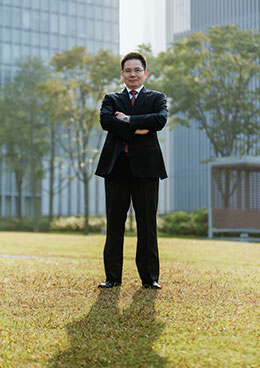Volume 31 · Number 2 · Spring 2014
Banking on Shan Li
To grow its economy and raise its standard of living, China needs a modern banking system. A leading architect of financial reform in the country is a UC Davis alum.

Shan Li, M.A. ’88, has been described as one of China's most influential financial leaders.
(Carsten Schael/carstenschael.com)
It’s a long way from Solano Park student apartments to the board rooms of China’s largest banks — further still when the route leads first to Wall Street and the financial district of London.
Shan Li, M.A. ’88, journeyed to the West and back to China, leaving an impoverished upbringing, gaining an education in Beijing, Davis and Cambridge, Mass., and becoming one of his country’s most influential financial leaders.
For the past 16 years, Li, 50, has played a pivotal role in privatizing most of China’s major government-run banks. A native of Sichuan Province, he worked on Wall Street as a foreign exchange trader at Credit Suisse First Boston, then with investment firm Goldman Sachs in New York, Hong Kong and London — rising rapidly from economist to executive director of investment banking. He walked away in 1998 from what he said were millions of dollars in stock offerings for a chance at helping his country launch an investment bank. A few years ensued before that effort succeeded, but along the way Li co-founded his own investment firm and built from scratch the world’s largest Internet real estate company. Today, he is chief international business adviser of China Development Bank, a national bank that finances large government projects, and chairman of Chinastone Capital Management, a private equity firm based in Shanghai.
His education in Western economics began at UC Davis.
Part of a first wave of students sent by the People’s Republic of China to study oversees — and one of the very first selected from a field other than science and engineering, Li arrived at UC Davis in 1986 with an undergraduate degree from Tsinghua University, the “MIT of China.”
At Tsinghua, one of Li’s professors was Zhu Rongji, who served as China’s premier in 1998–2003 and would later recruit Li to help modernize China’s banking system.
When he arrived at UC Davis, Li had little money and only a poor command of English — but he had the sponsorship of economics professor T.Y. Shen, who gave him money for an apartment and later helped him on his way to an MIT doctoral program.
Early on, Li obtained a teaching assistantship, granted on the condition that he pass an English competency test.
Despite his language struggles, he excelled in his studies. He received a Regents Fellowship — the first, Li said, ever granted at UC Davis to a student from China.
After marrying in China over the summer, he and his wife, Huarong Wang, lived at Solano Park.
When it came time for Li to leave for MIT, Shen again came to his aid, giving him a car to make the cross-country trip and promising more help. “T.Y. Shen said to me, ‘Don’t worry. . . If you can’t find money, you write to me, I’ll send money to you.’”
Driven by patriotism
After earning his doctorate from MIT in 1993, Li worked for Goldman Sachs in London. While there, former Tsinghua dean Zhu visited London as China’s premier. Li presented him with a proposal to create a Chinese investment bank. “I saw that China didn’t have an investment bank like Goldman Sachs for the capital deals.”
Deeply patriotic, Li left Goldman Sachs, despite an upcoming stock option, and worked for China Development Bank, forgoing his salary for 18 months.
After the investment bank did not get off the ground, Li left CDB to become head of Lehman Brothers China Investment Banking. Last year, he rejoined CDB.
The bank had undergone a dramatic transformation since his first job there 16 years ago. “In 1998, this bank was very small. . . . CDB is now three times as big as the World Bank, more powerful than the World Bank. Nowadays, among the top 10 banks in the world, maybe three or four are Chinese banks.”
Right place, right time
“China is undergoing a historical transformation, institutional change, new technology, all kinds of new things, exciting things, lots of opportunities. I was probably at the right place at the right time.”
With recent changes in China’s leadership — Premier Li Kequian, who took the country’s top office in March 2013, is an economist — Li is optimistic about his country’s future.
“I feel very fortunate. I feel it’s my duty to go back to my country to help the financial system,” Li said. “I really want to make a bigger contribution to this historical transformation of China, not only into a modern economy but into a modern society.”
